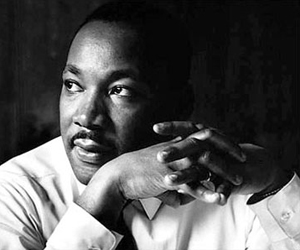The lessons of the Rev. Dr. Martin Luther King Jr.'s life and work are countless. Today, the most compelling lesson for us might be of how Dr. King and thousands of organizers and marchers sacrificed and what this means for us as people of faith in a broken world.
 The recent historical drama Selma chronicles King and his community's efforts to march from Selma, Alabama, to Montgomery to help win the introduction of the 1965 Voting Rights Act. The film show the starkness of what King and his contemporaries sacrificed: safety, family harmony, economic security, certainty that they would win, and in some cases their lives.
The recent historical drama Selma chronicles King and his community's efforts to march from Selma, Alabama, to Montgomery to help win the introduction of the 1965 Voting Rights Act. The film show the starkness of what King and his contemporaries sacrificed: safety, family harmony, economic security, certainty that they would win, and in some cases their lives.
Photo: Dr. Martin Luther King Jr. on the Edmund Pettus Bridge in Selma, Ala., on March 21, 1965, days after Bloody Sunday.Credit Associated Press
What are we willing to sacrifice for justice in this historic moment?
The latter part of 2014 may very well be remembered by historians as a pivotal moment in the ongoing struggle for racial equity. But that remains to be seen. What we are willing to give and give up will determine how this moment is viewed by generations to come.
Of course this moment may be remembered simply for the hundreds of protests that spread from Ferguson, Missouri, to New York City and around the world, all forcefully demanding, yet again, that Black Lives Matter. Now. Always.
This moment may even be seen by our children's children as a public memorializing of the countless lives lost not only as a result of police and vigilante violence but also because of a systemic rollback of policies that at one time helped to build the middle class. Policies that today are being called "handouts" now that the most vulnerable members of our society tend to overwhelmingly be people of color.
Furthermore, the work of thousands of grassroots activists calling on America's first black president to use the power of his office to push for policies to end the systemic criminalization of communities of color may be seen through the lens of history as necessary. Their labors may be seen as grounded in decades of work and their wins as inevitable. But as any student of history knows, little is inevitable without sacrifice.
What are we willing to sacrifice for justice when so much is at stake in our world today? Visit our colleagues at United Methodist Women to read more >> of this piece by Janis Rosheuvel and the Rev. Dionne P. Boissière.





